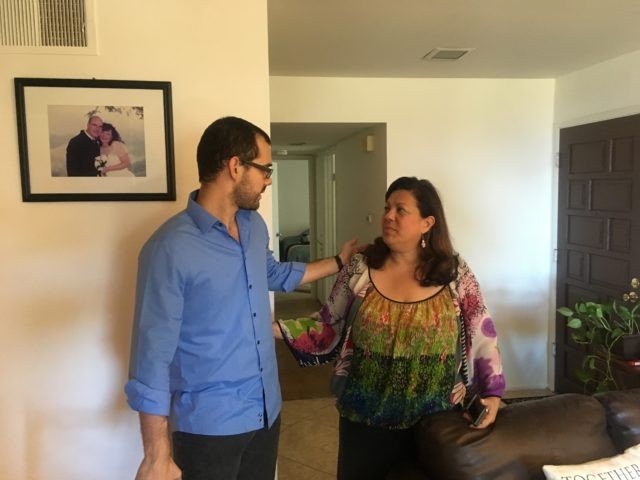DEL MAR, Calif. (AP) — Francisco Marquez says he constantly heard screams from prisoners being beaten in neighboring cells. He once saw a dozen inmates handcuffed, forced to run naked for hours under the hot sun as punishment for a failed escape attempt.
The 30-year-old dual U.S. citizen spoke of his four-month incarceration in his native Venezuela on Thursday, two days after he was freed and boarded a flight to join his parents in Southern California. He was arrested in June while taking part in a nationwide recall campaign against President Nicolas Maduro and accused of trying to foment violence. He says a judge dismissed charges in late July, leaving the socialist government with no justification to hold him.
Marquez lived in seven cells at four jails. The worst by far was the July 26th prison in central Venezuela, where he spent about two months and shared a cell with six others. He said he was never physically beaten but knew many who were and lived in fear that he might be next.
“I can only describe it as a dungeon,” he told The Associated Press in the living room of his parents’ home in Del Mar, a coastal suburb north of San Diego. “It was completely dark. No natural lights, full of mosquitoes, darkness, smell of feces, humid, full of just dark cobwebs and dust everywhere. There was only a small light, a small ray of light, sunshine came through.”
Marquez said his lawyers told him he was required to leave Venezuela immediately and avoid media exposure until he was gone. He believes diplomatic pressure contributed to his freedom but has no evidence and doesn’t know if pressure was applied by the U.S. government, which welcomed his release.
“This is an important gesture by the government of Venezuela, which we appreciate,” said State Department spokesman Mark Toner. “We continue to monitor the cases of other U.S. citizens detained in Venezuela and to provide appropriate consular services, including advocating for treatment consistent with internationally recognized standards and working to ensure that U.S. citizens are afforded due process under local laws and international standards.”
Venezuela’s Ministry of Information did not immediately respond for a request for comment.
On Thursday, Venezuela’s Supreme Court said it was granting house arrest to another imprisoned opposition activist. Former presidential candidate Manuel Rosales has been jailed for a year on corruption charges. He was arrested at the airport in October 2015 after he returned to the country following six years in exile. The court did not say why it was granting Rosales house arrest.
Marquez was born in Caracas and spent all his life in Venezuela, except eight years growing up in the Boston and Columbus, Ohio, areas, and as a student at Harvard University’s Kennedy School of Government, where he graduated in 2012. His Venezuelan mother was born in New York City, allowing him U.S. citizenship.
Marquez campaigned for opposition candidates in 2006 and 2012 against Maduro’s predecessor, Hugo Chavez, who died in 2013. He was chief of staff to an opposition mayor in the Caracas area when he was arrested.
While driving in western Venezuela on a campaign to collect signatures for Maduro’s recall, the National Guard found nearly $3,000 in local currency in his trunk at a highway checkpoint and about 150 pamphlets in the back seat that exposed his political leanings.
“I was very surprised at the moment, the way it was done,” Marquez said. Intelligence officers interrogated him throughout the night over his political affiliations and other matters.
Marquez was rarely allowed to meet with family while in prison. About three days before his release from a jail in Caracas, he saw Joshua Holt, a Utah man and high-profile prisoner who was arrested this year on weapons charges.
The two men spoke briefly. Marquez said Holt looked fine physically but couldn’t speak to his mental state.
“His eyes lit up a little bit because there was another person that spoke English and I know that meant something,” Marquez said. “Even though he speaks Spanish, it’s never the same hearing your mother tongue.”
On Thursday, Marquez spoke with reporters in Venezuela from a desk in his parents’ living room. He said he will continue to advocate for change in Venezuela and for others who he says are imprisoned there for their political beliefs.
“I’ve always been in politics in Venezuela,” he said. “It’s my passion, it’s where I was born, it’s where I’ve spent most of my life.”
___
Associated Press writers Hannah Dreier in Caracas, Venezuela, and Matthew Lee in Washington contributed to this report

COMMENTS
Please let us know if you're having issues with commenting.